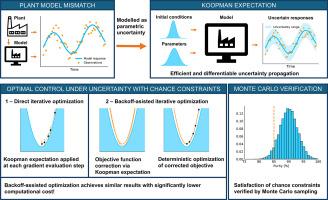Optimal control of uncertain batch processes via Koopman expectation-assisted gradient methods
IF 3.9
2区 工程技术
Q2 COMPUTER SCIENCE, INTERDISCIPLINARY APPLICATIONS
引用次数: 0
Abstract
Batch processes are indispensable in the chemical industry for producing low-volume, high-value products, leveraging their inherent flexibility to adapt to evolving market demands. While process control optimization promises significant potential for improving efficiency and profitability, discrepancies between plant behavior and model predictions, stemming from imperfect models and measurements, can lead to suboptimal or even infeasible outcomes. To address these challenges, our work focuses on developing efficient gradient-based methods for optimizing batch processes under parametric uncertainty, with the goal of satisfying process chance constraints. Central to our approach is the use of the Koopman expectation method, a novel and computationally efficient alternative to Monte Carlo simulations for propagating uncertainty in nonlinear dynamic systems. We explore two optimization procedures: Direct iterative optimization, which fully integrates the Koopman expectation into the gradient calculation loop, and Backoff-assisted iterative optimization, which combines deterministic optimization with probabilistic constraint corrections informed by the Koopman expectation. The Direct iterative optimization demonstrates robustness and is straightforward to implement, albeit with significant computational demands. In contrast, the Backoff-assisted method significantly reduces computational burden while maintaining satisfactory optimization results. Both methods are successfully applied to a case study involving the minimum time problem in batch distillation, demonstrating their effectiveness in achieving constraint satisfaction under uncertain initial conditions and model parameters. The proposed methodology is further applied to a batch crystallization case study, illustrating its broader applicability and effectiveness across different batch processing scenarios.

基于Koopman期望辅助梯度法的不确定批处理最优控制
批处理工艺在化工行业中是生产小批量、高价值产品不可或缺的,它利用其固有的灵活性来适应不断变化的市场需求。虽然过程控制优化承诺了提高效率和盈利能力的巨大潜力,但由于模型和测量的不完善,工厂行为和模型预测之间的差异可能导致次优甚至不可行的结果。为了解决这些挑战,我们的工作重点是开发有效的基于梯度的方法来优化参数不确定性下的批量过程,目标是满足过程机会约束。我们方法的核心是使用Koopman期望方法,这是一种新颖且计算效率高的替代蒙特卡罗模拟,用于在非线性动态系统中传播不确定性。我们探索了两种优化过程:直接迭代优化,它将Koopman期望完全集成到梯度计算循环中;backoff辅助迭代优化,它将确定性优化与由Koopman期望通知的概率约束修正相结合。直接迭代优化证明了鲁棒性,并且易于实现,尽管有大量的计算需求。相比之下,backoff辅助方法在保持令人满意的优化结果的同时显著减少了计算负担。两种方法成功地应用于间歇精馏最小时间问题的实例研究,证明了它们在初始条件和模型参数不确定的情况下实现约束满足的有效性。提出的方法进一步应用于批次结晶案例研究,说明其在不同批次处理场景中的广泛适用性和有效性。
本文章由计算机程序翻译,如有差异,请以英文原文为准。
求助全文
约1分钟内获得全文
求助全文
来源期刊

Computers & Chemical Engineering
工程技术-工程:化工
CiteScore
8.70
自引率
14.00%
发文量
374
审稿时长
70 days
期刊介绍:
Computers & Chemical Engineering is primarily a journal of record for new developments in the application of computing and systems technology to chemical engineering problems.
 求助内容:
求助内容: 应助结果提醒方式:
应助结果提醒方式:


